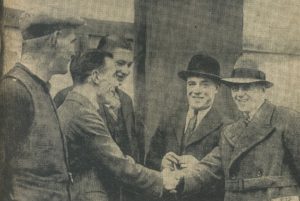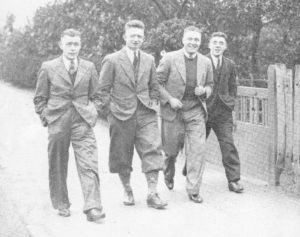TUNSTALL, Fred
Outside-Left.
Born: Darfield, 28 May 1897.
Died: Fishtoft, 21 July 1971.
Height: 5ft 7½in.
Weight: 11st 6lb.
Halifax Town debut: v Gateshead (h), Division Three (North), 4 February 1933. Won 1-0.
Career: Darfield St. George’s; Scunthorpe United June 1920; Sheffield United 3 December 1920 (£1,000); Halifax Town 3 February 1933; Boston United 30 July 1936, player-manager May 1937 to cs 1940, manager cs 1945, resigned 1 March 1947, trainer May 1950 to 1968, manager 1964-65, groundsman.

Fred Tunstall (right) is greeted by Maurice Wellock after signing for the Shaymen in February 1933. Watching on are club trainer Bob Suter (left), his son Bob Suter jnr, and a director.
For those that saw him play, there is no question that Fred Tunstall was the finest player ever to turn out for Halifax Town. It has often been suggested that his appearance in the side would mean an extra one thousand spectators at the gate, and whilst the evidence doesn’t necessarily support this, this story does at least indicate how much ‘Tunny’ was revered at The Shay. His signing by manager Alex Raisbeck in February 1933 was something of a major coup and though it may be fair to say that his best days were behind, Tunstall still offered much to Town’s cause, with crafty wing play and a venomous shot. Tunstall’s name was widely known in the game well before he signed for Halifax Town. An England international left-winger, he had come to prominence with Sheffield United after humble beginnings which saw him working as a pony driver in the coalmines and playing football for his local church side Darfield St George’s. In 1919-20, Tunstall was a key member of the side which won the treble of Beckett Hospital Cup, Barnsley Charity Cup and Walton Charity Cup. Having caught the eye of other clubs, Tunstall was signed by Midland League side Scunthorpe & Lindsay United in June 1920 and he continued to enhance his growing reputation. Thus his time with the Iron was short; he had made only nineteen league appearances and scored two goals when he was signed by First Division Sheffield United in December 1920 for £1,000, a record fee received by a non-league club at the time. The day after his signing Tunstall made his League debut on the left wing at Tottenham Hotspur, although he couldn’t prevent his new club from slipping to a 4-1 defeat. But he quickly endeared himself to the supporters at Bramall Lane as he made the outside-left position his own and scored his first goal for the Blades in the 2-2 draw at Middlesbrough on 22 January 1921. With the likes of Billy Gillespie and George Green in the side, Tunstall became part of one of Sheffield United’s greatest teams, one that finished fifth in the First Division in 1923-24 and again two seasons later. In 1924-25 he was instrumental in helping United reach the FA Cup Final. His third minute strike in front of 51,745 was enough to beat Everton in the third round, and having scored in the 2-0 fourth round win over West Bromwich Albion, Tunstall went on to grab a brace in the semi-final against Southampton at Stamford Bridge as United won 3-0. His crowning moment, however, was reserved for the final, played at Wembley on 25 April 1925. Cardiff City provided the opposition, but it was Tunstall who settled the issue, making the most of left-back Harry Wake’s hesitancy in dealing with a crossfield ball. Tunstall nipped in and raced through to beat keeper Tom Farquharson for the only goal of the match after thirty minutes’ play. Ever-present in 1925-26, Tunstall weighed in with twenty goals, although he had become by then the side’s regular penalty.

Sporting the fashions of the day are, from left, Tom Barkas, Albert Valentine, Tom Feeney and Fred Tunstall, circa 1936.
During his time at Bramall Lane, Tunstall netted a total of 31 goals from the penalty spot. He was awarded the first of his seven England caps for the match with Scotland at Hampden Park on 14 April 1923, a game which ended 2-2. His last cap also came at Hampden Park two years later, but in May 1926 Tunstall was part of the English FA touring party which visited Canada and was made captain. Tunstall went on to make 437 appearances and score 129 goals for Sheffield United but by the time he joined Halifax Town he had lost his place in the side following a serious knee injury. By now thirty-five years old, Tunstall nevertheless proved to be one of Raisbeck’s most astute signings. He made his debut in a 1-0 win over Gateshead, a game which saw the attendance three thousand up on the previous home match, and he immediately made the outside-left position his own, much to the disappointment of young Frank Betteridge, who was forced to toil away in the reserves but who provided useful cover. It was hoped Tunstall’s signing might see the Shaymen into the quarter-final of the FA Cup, but alas, in the blizzard-affected game with Luton Town, they slipped to a 2-0 defeat in the fifth round. Tunstall scored his first goal for the club in a 4-2 defeat of Darlington on 22 February 1933, his spectacular shot from the edge of the box going in off the underside of the bar, and he went on to grab the first of three hat-tricks for the club in that match. Among Tunstall’s highlights were the scoring of all his side’s goals in a 4-2 victory over Stockport County early the following season, and helping the side to runners-up spot in 1934-35 in what was surely Halifax Town’s greatest side of the pre-Second World War era. Though it has to be said, that whilst Tunstall was famed for his fearsome shot and all-round great play, he was also a member of the Town side which crashed 13-0 at Stockport County in January 1934. Tunstall left the club in July 1936 to sign for Midland League side Boston United, and succeeded manager Arthur Greaves after his first season. Tunstall continued to play, and on 18 September 1937 he scored his side’s last goal – a penalty – of a record 10-0 win over Bilsthorpe Colliery in the FA Cup. He managed the club for two seasons until the outbreak of the Second World War, then took up employment as a lorry driver whilst continuing to play for Boston. Upon the ceasing of hostilities, Tunstall took up the post of manager once more until his shock resignation in March 1948. He returned to the club as trainer in May 1950, then later became groundsman. But in 1964-65 he returned as manager for one season whilst the club played in the Boston & District League. Tunstall continued to live in Boston and died in White House Hospital, Fishtoft, following an illness.
| League | FA Cup | NS Cup | WRSC | Total | |||||||||
| Apps | Gls | Apps | Gls | Apps | Gls | Apps | Gls | Apps | Gls | ||||
| 1932-33 | 16 | 5 | 1 | 0 | 0 | 0 | 0 | 0 | 17 | 5 | |||
| 1933-34 | 31 | 20 | 4 | 1 | 2 | 1 | 0 | 0 | 37 | 22 | |||
| 1934-35 | 36 | 15 | 2 | 0 | 2 | 1 | 1 | 0 | 41 | 16 | |||
| 1935-36 | 22 | 0 | 0 | 0 | 0 | 0 | 1 | 0 | 23 | 0 | |||
| 105 | 40 | 7 | 1 | 4 | 2 | 2 | 0 | 118 | 43 | ||||
Read more posts by Johnny Meynell
